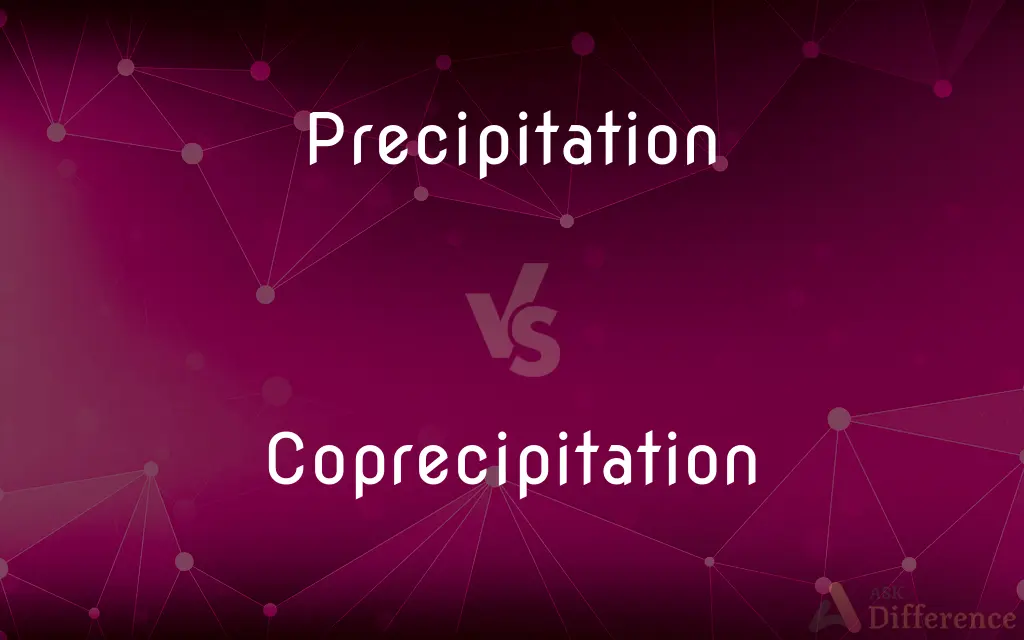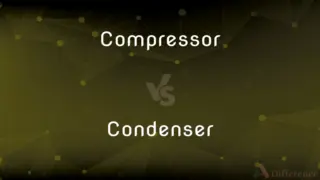Precipitation vs. Coprecipitation — What's the Difference?
By Tayyaba Rehman — Updated on September 27, 2023
Precipitation refers to any liquid or solid water form falling from clouds, or in chemistry, a solid formed in a solution. Coprecipitation is a chemistry term, where an unintended substance co-precipitates with the intended one due to solubility.

Difference Between Precipitation and Coprecipitation
Table of Contents
ADVERTISEMENT
Key Differences
Precipitation and Coprecipitation, while sharing the root word 'precipitate', signify distinct concepts, one more universal and the other specifically applicable to chemistry. Precipitation, in meteorological terms, describes any form of water - liquid or solid - falling from clouds, such as rain, sleet, snow, or hail, playing a pivotal role in Earth’s water cycle. In chemistry, precipitation pertains to the formation of a solid substance from a chemical reaction within a solution, typically leading to the solid settling at the bottom of the container.
Coprecipitation, on the other hand, is specific to chemistry, denoting a scenario where an unintended substance precipitates along with the intended substance during a chemical reaction. This can occur due to similar chemical properties or solubility between the substances, leading to the inadvertent precipitation of one substance with another. Coprecipitation is crucial when discussing the purity of a precipitated substance and is often considered when planning separation or purification strategies.
While precipitation is a natural and fundamental process essential for maintaining ecological balance, providing water to all earth's organisms, and sustaining life, coprecipitation is primarily of concern in laboratory settings, impacting the accuracy and reliability of experimental results and subsequent analyses. Understanding the mechanisms and conditions leading to coprecipitation is vital for chemists and researchers working on isolating specific compounds or elements.
In essence, precipitation is a broader term describing a natural meteorological phenomenon or a chemical process, while coprecipitation is a specialized term referring to a concurrent precipitation of substances within a solution in a chemical context, primarily impacting the qualitative outcomes in chemical research.
Comparison Chart
Definition
Water released from clouds or solid formed in a solution
Unintended substance forming solid with intended one.
ADVERTISEMENT
Field
Meteorology and Chemistry
Chemistry
Occurrence
Natural weather process or in a chemical solution
Occurs during chemical reactions in solutions
Impact
Essential for the water cycle and ecology
Affects purity and quality of chemical experiments
Consideration
Natural phenomena and in laboratory synthesis
Primarily in chemical synthesis and analysis
Compare with Definitions
Precipitation
In chemistry, it’s the process where a solid forms in a solution during a chemical reaction.
The experiment resulted in the precipitation of a white crystalline substance at the bottom of the beaker.
Coprecipitation
It is crucial in determining the purity of the precipitated substance.
Analyzing coprecipitation is vital to ensure the accuracy and reliability of the obtained results in chemical research.
Precipitation
It’s an essential component of the water cycle, involving the conversion of atmospheric water vapor into liquid water or ice.
Precipitation is crucial for replenishing freshwater sources on Earth, sustaining life.
Coprecipitation
It is often taken into account when developing strategies for substance separation or purification.
The chemist had to devise a new approach to deal with the challenges posed by coprecipitation in isolating the element.
Precipitation
Any form of water, liquid or solid, falling from clouds and reaching the ground.
The weather forecast predicts precipitation throughout the day, with chances of both rain and snow.
Coprecipitation
In chemistry, it’s when a substance precipitates along with another substance unintentionally.
The researcher noted a coprecipitation occurrence during the experiment, complicating the process of isolating the desired compound.
Precipitation
It is measurable and can vary in intensity, from light drizzle to heavy downpour.
The region experiences heavy precipitation during monsoon season, leading to a lush green landscape.
Coprecipitation
It affects the outcomes of chemical experiments and analyses by introducing unintended substances.
Proper consideration of coprecipitation phenomena is crucial to avoid contamination in the final product.
Precipitation
It encompasses various forms like rain, snow, sleet, and hail, each occurring under different atmospheric conditions.
The mountaintops receive precipitation mainly in the form of snow due to the lower temperatures at higher altitudes.
Coprecipitation
It occurs when substances have similar chemical properties or solubility, leading to concurrent precipitation.
The coprecipitation of impurities along with the target molecule necessitated further purification steps.
Precipitation
In meteorology, precipitation is any product of the condensation of atmospheric water vapor that falls under gravitational pull from clouds. The main forms of precipitation include drizzling, rain, sleet, snow, ice pellets, graupel and hail.
Coprecipitation
In chemistry, coprecipitation (CPT) or co-precipitation is the carrying down by a precipitate of substances normally soluble under the conditions employed. Analogously, in medicine, coprecipitation is specifically the precipitation of an unbound "antigen along with an antigen-antibody complex".Coprecipitation is an important topic in chemical analysis, where it can be undesirable, but can also be usefully exploited.
Precipitation
The action or process of precipitating a substance from a solution.
Coprecipitation
(chemistry) The precipitation of an otherwise soluble substance through the precipitation of another substance.
Precipitation
Rain, snow, sleet, or hail that falls to or condenses on the ground
These convective processes produce cloud and precipitation
The heavy post-monsoon precipitations
Precipitation
The fact or quality of acting suddenly and rashly
Cora was already regretting her precipitation
Precipitation
Any form of water, such as rain, snow, sleet, or hail, that falls to the earth's surface.
Precipitation
The quantity of such water falling in a specific area within a specific period.
Precipitation
A hastening or acceleration, especially one that is sudden or unexpected
He is responsible for the precipitation of his own demise.
Precipitation
Abrupt or impulsive haste.
Precipitation
A headlong fall or rush.
Precipitation
(Chemistry) The process of separating a substance from a solution as a solid.
Precipitation
(meteorology) Any or all of the forms of water particles, whether liquid or solid, that fall from the upper atmosphere (e.g., rain, hail, snow or sleet). It is a major class of hydrometeor, but it is distinguished from cloud, fog, dew, rime, frost, etc., in that it must fall. It is distinguished from cloud and virga in that it must reach the ground.
Precipitation
A hurried headlong fall.
Precipitation
A reaction that leads to the formation of a heavier solid in a lighter liquid; the precipitate so formed at the bottom of the container.
Precipitation
(figuratively) Unwise or rash rapidity; sudden haste.
Precipitation
The act of precipitating, or the state of being precipitated, or thrown headlong.
In peril of precipitationFrom off rock Tarpeian.
Precipitation
A falling, flowing, or rushing downward with violence and rapidity.
The hurry, precipitation, and rapid motion of the water, returning . . . towards the sea.
Precipitation
Great hurry; rash, tumultuous haste; impetuosity.
Precipitation
The act or process of precipitating from a solution.
Precipitation
A deposit on the earth of hail, mist, rain, sleet, or snow; also, the quantity of water deposited.
Precipitation
The quantity of water falling to earth at a specific place within a specified period of time;
The storm brought several inches of precipitation
Precipitation
The process of forming a chemical precipitate
Precipitation
The falling to earth of any form of water (rain or snow or hail or sleet or mist)
Precipitation
The act of casting down or falling headlong from a height
Precipitation
An unexpected acceleration or hastening;
He is responsible for the precipitation of his own demise
Precipitation
Overly eager speed (and possible carelessness);
He soon regretted his haste
Common Curiosities
Is precipitation essential for the environment?
Absolutely, precipitation is crucial for maintaining ecological balance and is a key component of the water cycle.
Is coprecipitation an unintended process?
Yes, coprecipitation typically refers to the unintended precipitation of a substance along with another in chemistry.
Why is coprecipitation significant in chemistry?
Coprecipitation is significant as it affects the purity and outcomes of chemical experiments and analyses.
Does precipitation contribute to freshwater sources?
Yes, precipitation is vital for replenishing freshwater sources on Earth.
Is precipitation a natural process?
Yes, precipitation is a natural process essential for the water cycle and ecology.
Is precipitation only related to weather?
No, precipitation also refers to a chemical process where a solid forms in a solution.
Can precipitation occur in various forms?
Yes, precipitation can occur as rain, snow, sleet, or hail.
Can coprecipitation be avoided?
While challenging, implementing precise conditions and purification steps can minimize coprecipitation.
Is coprecipitation considered in separation strategies?
Yes, coprecipitation is crucial when planning strategies for substance separation or purification.
Does coprecipitation complicate chemical synthesis?
Yes, coprecipitation can complicate chemical synthesis by introducing unintended substances, affecting purity.
Can precipitation be measured?
Yes, precipitation is measurable, and its intensity can range from a light drizzle to a heavy downpour.
Does precipitation occur in solid form?
Yes, precipitation can occur in solid forms like snow and hail.
Is coprecipitation a common occurrence in chemical reactions involving solutions?
Yes, coprecipitation is a common phenomenon in chemical reactions involving solutions due to similarities in chemical properties or solubility.
Can coprecipitation affect the reliability of experimental results?
Yes, coprecipitation can impact the reliability and accuracy of experimental results by introducing unintended substances.
Is understanding precipitation crucial for meteorology?
Absolutely, understanding precipitation is fundamental for meteorology to predict weather patterns and phenomena.
Share Your Discovery

Previous Comparison
Compressor vs. Condenser
Next Comparison
Psychology vs. LogicAuthor Spotlight
Written by
Tayyaba RehmanTayyaba Rehman is a distinguished writer, currently serving as a primary contributor to askdifference.com. As a researcher in semantics and etymology, Tayyaba's passion for the complexity of languages and their distinctions has found a perfect home on the platform. Tayyaba delves into the intricacies of language, distinguishing between commonly confused words and phrases, thereby providing clarity for readers worldwide.















































